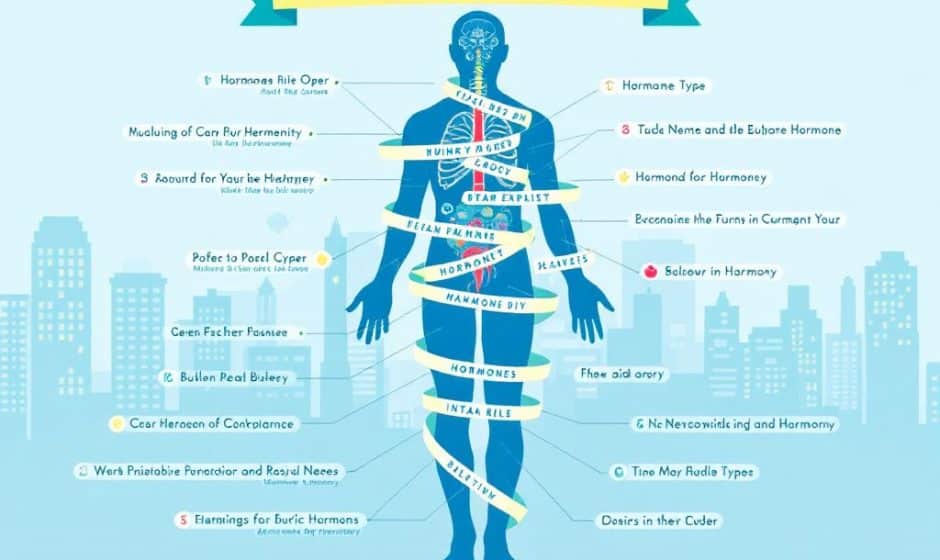Ever found yourself wondering why you suddenly feel euphoric after your weekly run or experience a cravings attack precisely at 3 PM every day? Or maybe you’re just curious about what makes you tick—hormones are to blame! Understanding the different types of hormones and their roles in our bodies can feel like trying to decipher an ancient secret language. But trust me, it’s like the holy grail of insights for anyone trying to get a grip on their health, mood, or even pesky food habits.
Hormones are these incredible little messengers flying around your body, orchestrating everything from growth to mood swings. They’re the real deal when it comes to maintaining balance, and you’d be surprised at just how much they influence. They’re important, no doubt. This chat’s all about breaking them down in a way that’ll make you nod in occasional knowing agreement or even gasp in surprise.
Breaking Down the Hormone Teams
Let’s start with the basics. You’ve got several main types of hormones, each performing distinct tasks that keep systems running smoothly. Handling growth, mood, metabolism, and even your sleep schedule—they’re quite the multitaskers.
The Energetic Peptides
Peptide hormones are all about the extracurricular activities your body’s up to. Think insulin! It’s a peptide hormone that helps manage your blood sugar level. It tells your cells, “Hey, snag that glucose,” promoting energy that fuels your every move. These hormones work hard, managing appetite and your mood swings by regulating serotonin levels. Ever felt an energy dip between meals? Peptides are behind those prompts to reach for an afternoon snack—annoying yet fantastic.
Often discussed, but sometimes in the background, are those growth-promoting peptides, like HGH (human growth hormone). This is your backbone when it comes to cell reproduction—literally growing and regenerating cells. It’s key in managing how we develop physically and internally.
The Slick Steroids
While you might think of steroids only in terms of bodybuilding, natural steroid hormones have tasks beyond the gym! Cortisol, for instance, perched high on its steroid hormone throne, is one mighty example—it jumps into action during stress. Need a little push to tackle a looming deadline? It’s cortisol making sure you’re up for the challenge. But too much, and you might just find yourself bleary-eyed at 2 AM. ‘Remember to relax’ should be some advice as cortisol knows when you’re in need of a time out.
And what about those sex hormones? Testosterone and estrogen rule this arena, setting regulation in aspects of body hair, libido, and muscle mass for all you aspiring weekend athletes. These define our reproductive processes, but also secretly influence bone density and even mood regulation.
The Alert Amines
These guys are like the traffic directors in your nervous system. Epinephrine—yep, adrenaline—is one key player in the amine category. Ever had a thrill when you had to think quickly or lept into action? Thank epinephrine, the energizing force behind every thrilling roller coaster ride. Its partner, norepinephrine, takes on ruling duties, regulating alertness, and focus during moments when calm is constant.
Another renowned amine is thyroxine from the thyroid, managing heart rate and metabolism. It subtly ensures you maintain that zest and keeps energetic balance in check.
The Territorial Ecosanoids
Finally, ecosanoids are the neighborhood helpers, carrying out duties in local settings without going on extensive trips across the bloodstream. They’re known for inflammation response. Have you ever stubbed a toe and felt that throbbing developing immediately? That’s their domain! They’re surrounding the scene, announcing help and signaling defense quick as lightning.
Navigating Hormonal Imbalances
Now, let’s shift gears a bit. The balance of these hormones—a delicate orchestra—can wildly sway your health when thrown off. It’s crucial to lend a cosmic ear to hormonal health, listening to your body’s symphony from time to time.
The Alert of Imbalances
An increase or decrease in any type of hormone might lead to more substantial health puzzles than you enjoy solving.
**High Cortisol:** Long-term stress can lead to elevated levels of cortisol, contributing to fatigue, sleep problems, or frustrating weight gain. Pay attention to persistent sleep struggles or unwilling weight shifts.
**Low Insulin Sensitivity:** Insulin controlling blood sugar right now? A decrease in sensitivity means excessive blood sugar lest managed, paving the road towards diabetes.
Consider hormonal shifts! Feeling more emotional pre-period is courtesy of fluctuating estrogen levels. All normal but noticing extreme swing could suggest giving a healthcare provider a friendly nod for advice.
Addressing These Hormonal Grumbles
Taming the hormone storm is often simpler than expected; small changes, huge impacts.
Enjoy Regular, Mild Exercise
Mild activity resets cortisol and improves mood with endorphin boosts. When you’re out walking briskly, don’t over-complicate it. Just let the good feelings tackle that laborious stress.
Hydrate!
Grab a glass rather than snacking next time swift hunger pokes through in small luring pangs. It’s surprising, but dehydration mimics hunger hormone signals often.
Proper Sleep Routine
Aim for leafy consistency. Similar hours to rest prompt guess what? Hormones like melatonin manage when you sleep. It’s accidental mismanagement dealt upon no restful strategy.
And emphasize structured meals too, minimizing sudden sugar spikes that kickstart erratic extremes like hypoglycemia. Think stable not Spartan!
FAQ: Scratching That Learning Itch
Curiosity peaked? Let’s bull-doze through simple Q&As:
**Q: What decisive role does Estrogen capture?**
A: It structure regulates it firmly—all credit to impacts developing reproduction and thickens hair! Hoping for shiny glory? Estrogen subtly lifts those vibes.
\\
**Q: How is Memory parkoured away by Hormones?**
A: Cortisol steals spotlight again! Whilst proving useful short, longer surges influence memory clear paths.
Final Musings: Embracing Your Inner Hormonal Harmony
And, there you have it—the lowdown on the decisive type of hormone tea. Whether dealing with accidents or aiming to understand each physician-loving layer, an insight to dance with chemistry never dulls moments. Explore personal cycles genuinely, observe changes calling healthy questions into discussion, and engage active thought into wellness recultivation.
Ready to embrace hormonal dialogue deeply tapping into balance? Sometimes just a single answer brings full circle to awe-inspiring conversations. Remember: your choices propel fine-tuned health moderator— ever-ceaseless.
Frequently Asked Questions
What are the benefits of using a hair mask in my hair care routine?
Using a hair mask can provide several benefits, including hydration, smoothing, strengthening, curl definition, heat protection, and damage repair. Hair masks infuse the hair with moisture, help coat the hair shaft to seal split ends, reduce breakage, and protect the hair from heat styling and environmental damage[1][4].
What ingredients should I look for in a hair mask?
Effective hair masks often include ingredients such as coconut oil, argan oil, shea butter, honey, avocado oil, green tea, and coconut water. These ingredients provide nourishment, moisturize, and protect the hair, offering benefits like softening, moisturizing, and protecting against damage[2][5].
How often should I use a hair mask in my routine?
You should use a hair mask whenever your hair feels dry, unmanageable, or in need of intense hydration. This can vary depending on your hair type and needs, but generally, using a hair mask once or twice a week can help maintain healthy and moisturized hair[1][4].
How do I apply a hair mask for the best results?
To apply a hair mask effectively, shampoo your hair first, then apply the mask, focusing especially on the ends where hair tends to be the most damaged. Leave the mask on for anywhere from 10 minutes to overnight, depending on the type of mask and your hair’s needs[1][4].
References



